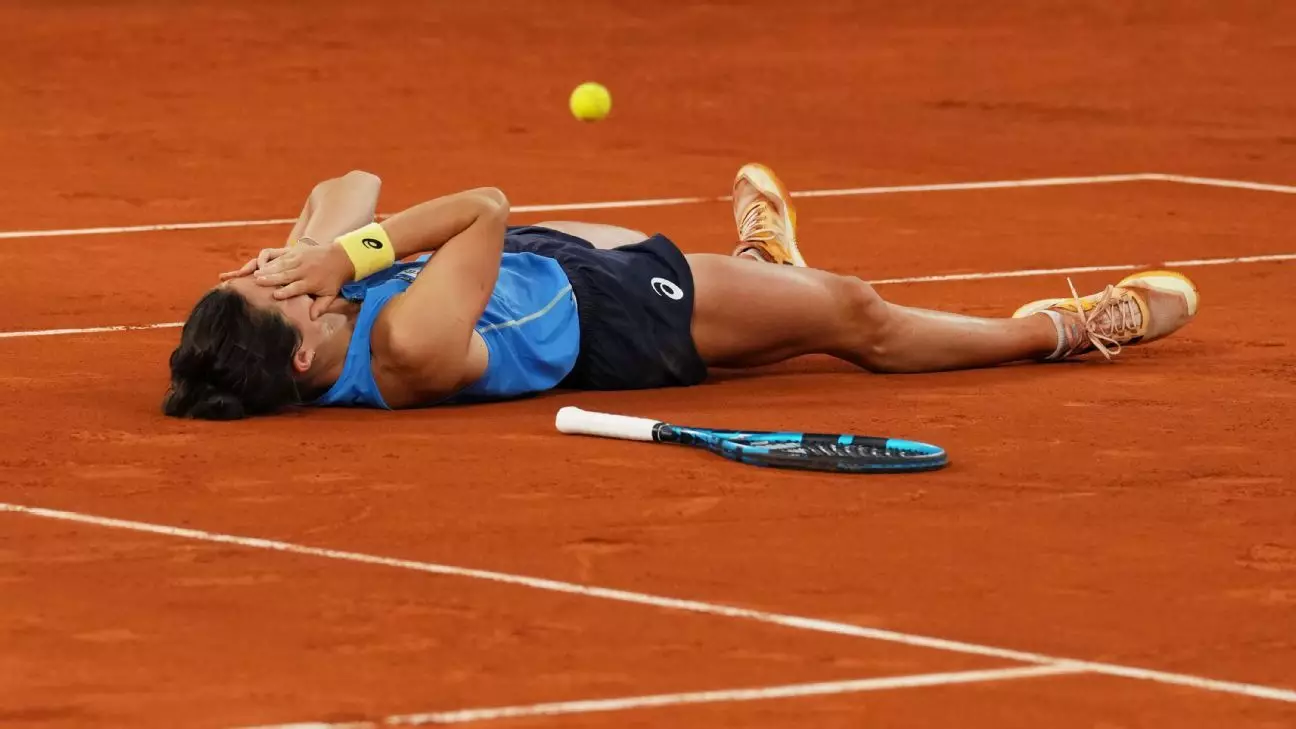Loïs Boisson, a 22-year-old wild-card entry from France, has left an indelible mark at this year’s French Open. In a stunning performance, she emerged victorious against sixth-ranked Mirra Andreeva, winning in straight sets 7-6 (6), 6-3. Playing in front of a captivated and passionate Parisian crowd, Boisson not only showcased her talent and determination but also tapped into the spirit of French tennis, which has long craved a homegrown champion. Her victory serves as a reminder of the unpredictable beauty of sport, especially in the emotionally charged atmosphere of a Grand Slam.
Atmosphere and Emotion: A Crowd’s Influence
The ambiance during Boisson’s match was electric. Fans enthusiastically supported the local hero, chanting her name and waving the tricolor flag, creating a cacophony of national pride. However, this fervent support had a dual effect. While it buoyed Boisson, it also seemed to unnerve her opponent, Andreeva, who visibly struggled to maintain her focus amid the cheers and jeers. The contrast highlighted the psychological battles that accompany high-stakes matches; one player relished the support of the home crowd, while the other found it suffocating.
This unique dynamic raised questions about how external factors can sway performances at high-level competitions. For Boisson, the crowd played a critical role in her journey, amplifying her confidence despite the high pressure. “It’s incredible. Thank you for supporting me like this,” Boisson remarked to the crowd, embodying the deep connection athletes forge with fans.
The Match: Strategy and Skill
Throughout the match, Boisson displayed remarkable resilience. In the first set, despite being tense and making uncharacteristic errors early on, she demonstrated a remarkable ability to recover. Key moments punctuated the set: being down a break multiple times never deterred her spirit. Her mixture of heavy spin and deep groundstrokes repeatedly troubled Andreeva, forcing her into uncomfortable positions. It was a classic narrative of underdog tenacity battling against the burden of expectation.
Andreeva, meanwhile, showcased her own skill but was haunted by missed opportunities. After taking a 5-3 lead, she faltered at crucial moments, allowing Boisson to claw back and ultimately take the set in a tiebreaker fraught with tension. The Russian’s frustration reached a boiling point when she received a warning after an outburst directed at an umpire’s call, a testament to the emotional strain that such high-profile matches can impose.
A Historic Achievement
Boisson’s achievement in reaching the semifinals is historic on multiple fronts. She now stands as the first woman since Jennifer Capriati in 1990 to reach this stage at her Grand Slam debut. Moreover, being the first wild-card entry to reach the French Open semifinals in the Open Era illustrates a significant breakthrough. Such milestones are not just numbers; they symbolize hope and inspiration for aspiring athletes everywhere, particularly young girls dreaming of greatness in a sport where female representation has been increasingly pivotal.
Furthermore, the fact that Boisson is the youngest French semifinalist at a Grand Slam since Amélie Mauresmo in 1999 amplifies her story. It connects the past with the present, bridging generations of French tennis history. As Boisson prepares to face off against the formidable Coco Gauff in the next round, all eyes will undoubtedly be on her, not only for her skill on the court but for the compelling narrative that she now embodies.
Looking Ahead: A New Challenger Emerges
As Lois Boisson gears up to face Gauff, anticipation surrounds her next move. Gauff, ranked No. 3 in the world, is a seasoned competitor with a knack for rising to the occasion, especially in crucial matches. Nevertheless, Boisson’s journey thus far reveals a player who possesses the rare combination of skill, resilience, and the ability to thrive under pressure. Her unprecedented performance at this tournament might just be the beginning of something remarkable.
In the realm of tennis, where narratives often intertwine with national pride and individual aspiration, Boisson’s story resonates deeply. Her victory is more than just a personal triumph; it is a testament to the power of determination, the thrill of home-ground support, and the unpredictable magic of sport. Whether she prevails against Gauff remains uncertain, but one thing is clear: Lois Boisson is not just a participant in this tournament; she is a beacon of inspiration for the future of French tennis.


Leave a Reply